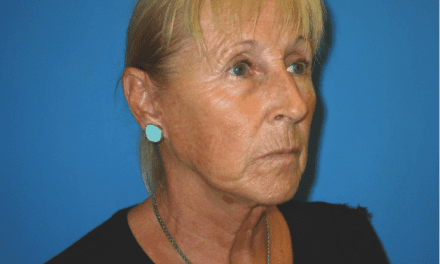Word of mouth is powerful. If you’re doing your best to make every patient’s experience memorable, the effort pays off in time, says oculofacial plastic surgeon Chaneve Jeanniton, MD, FACS (pictured left at a promotional event, prior to COVID-19), owner of the Brooklyn Face & Eye holistic boutique, and founder of the epi.logic skincare brand.
By Tonya Johnson
In part two of our interview with Chaneve Jeanniton, MD, FACS, an oculofacial plastic surgeon in Brooklyn; and Lara Devgan, MD, MPH, FACS, a plastic and reconstructive surgeon in Manhattan, Plastic Surgery Practice conducted a Q&A to learn more about what it takes to launch a successful skincare line, why they chose a career in plastic surgery, tips for fellow physicians, and their thoughts on COVID-19. (Read part one here.)
To keep a private practice and skincare product line growing, adhere to your values and keep a lean overhead, Jeanniton advises. She collaborates with consultants like Marjon Carlos (pictured above, right), who is responsible for brand strategy and the public relations efforts for her signature skincare collection, epi.logic, that launched last year; but mostly relies on a small staff (which includes a medical assistant and aesthetician) to help keep the wheels turning on a daily basis.
Jeanniton believes in taking a holistic approach to beauty. “Even if a patient comes in wanting to focus on under eye filler, I take our time together as an opportunity to educate her on how she can optimize her home and in-office regimens,” she says. “I’ll introduce the topic of skincare and recommend products, from epi.logic, as well as other brands. The advice has been well received, and my patients appreciate that their best long-term result is my priority.”

“Establishing a footprint, especially in an area as competitive as New York is tough when you’re intentionally keeping things small,” she says. But, “word of mouth is powerful and if you’re doing your best to make every patient’s experience memorable, the effort pays off in time.”
Devgan created her skincare line, Dr. Devgan Scientific Beauty, to benefit her Manhattan patients as well. “We are very fortunate to live in a time where the whole world is available in our pockets through our smart phone. The Internet has made the world much smaller. Particularly in a post-COVID world, we have a tremendous opportunity to harness social media and traditional media. We can educate patients and demystify what is really a very opaque field for many people,” she says.
Dr. Devgan Scientific Beauty:
Platinum Lip Plump SPF 30Dr. Devgan Scientific Beauty:
Hyaluronic Serum
PSP: WHAT HAS THE SKINCARE DEVELOPMENT PROCESS BEEN LIKE FOR YOU?
Jeanniton: From concept to launch, developing epi.logic took three years, and the reception has far exceeded my expectations. Both consumers and beauty editors alike have really made me feel like I created something special.
Devgan: Overall it can take anywhere from 8 to 12 months, or even longer. There are other things to consider as well. Try to design products that will fit into people’s lives and help them solve a problem. Answer their question— that’s a very important thing to think about.
PSP: HOW DO YOU OVERCOME THE OBSTACLES IN SMALL BUSINESS OWNERSHIP?
Jeanniton: As physician-entrepreneurs we are all collectively overcoming several obstacles. Running an aesthetic practice is no small feat, especially now as we are grappling with a global health pandemic. In general, running a business requires a nimble mind and an agile demeanor. I am relying on these attributes now more than ever.
Every day brings a new challenge and that should be embraced. I was venting to a colleague about some issues I was facing running the businesses, and she said to me, “These are all growing pains and you should be proud. The fact that you’re dealing with these issues means that you’re breaking new ground.”
Devgan: We all have to go into the world and face the day every morning being ready to solve whatever problems come. I’ve had many challenges with the skincare line. There have been so many hiccups along the way. For example the challenge of needing to place extremely large product run orders while still trying to assess the market demand for the products. In maintaining our supply chain, we have to anticipate and forecast the demands for products 6 to 12 months before we’ll need them. If we over-forecast, we’ll have too much supply and surplus goods and the products will expire on the shelves. If we under-forecast, we’ll sell out and won’t be able to meet the consumers’ needs and some people who wanted to product will go elsewhere. I haven’t figured out a solution yet, but I’m having fun doing it.

PSP: WHAT ADVICE DO YOU OFFER DOCTORS WHO WANT TO LAUNCH A SKINCARE COLLECTION?
Jeanniton: It’s imperative to have a clear concept of what makes your contribution unique. As we are all aware, the skincare market is saturated and it’s tough to make a dent. If you can’t validate to yourself why the world needs your product, you certainly won’t be able to convince anyone else.
epi.logic:
Clean Reveal Brightening Gylycolic CleanserDr. Devgan Scientific Beauty:
Platinum Long Lash
Devgan: In order to give somebody a great experience, whether it’s in the operating room doing a facelift in the procedure room, doing a Botox injection, or in their bathroom putting a serum on their face, there are a thousand tiny decisions that have to be made. If you want to do something like this, you have to have the mentality of somebody who wants to make a thousand small decisions for every single small interaction and small moment of human happiness.
In addition, you have to be committed to being action oriented and trying to move things forward. My main goals are to think about progress, science, technology, and beauty, everyday. You have to also be an organized hard worker and someone who is very detail-oriented because there are a lot of moving pieces. It’s not just about product packaging and design; it’s also about shipping, delivery, and so much more.
READ MORE: PSP CELEBRATES NATIONAL SKIN CARE AWARENESS MONTH! PLASTIC SURGEON INTRODUCES A GOLD MICROPARTICLE ACNE TREATMENT TO HIS PATIENTS
PSP: WHY DID YOU CHOOSE A CAREER IN PLASTIC SURGERY?

Jeanniton: I completed my training in oculoplastic surgery in 2013. The pull towards aesthetics was immediate and strong during my training. Robert Della Rocca, MD, was the chairman of my residency program and his passion for the subspecialty left an indelible impression upon me. Not only did I fall in love with oculoplastics, but I knew I needed to be trained by him. My fellowship was a dream come true. Not only did I get to train under Rocca and the oculoplastics team at the renowned New York Eye and Ear Infirmary, but I was also afforded opportunities to collaborate with premier cosmetic dermatologists in NYC to round out my training.
Devgan: I love that plastic surgery is a combination of not just art and science, but also technology and extreme customization. In 2020 and beyond, I think that individual and identity are becoming more and more important topics. A modern take on plastic surgery means you have the freedom to be your own kind of beautiful and you also have the ability to help people achieve the feeling of confidence in a way that reinforces their sense of self. It’s not all about cookie-cutter ski slope noses and magazine picture breasts, it’s about making people feel comfortable in their own skin and how that can translate into the feeling of confidence that will allow us all to be more present and productive.
PSP: WHAT ADVICE DO YOU GIVE GRAD STUDENTS AND FUTURE RESIDENTS?
Jeanniton: Oculoplastic surgery was the right path for me because I love having such a concise surgical focus. However, plastic surgery has such rich and diverse subspecialties that I’d recommend that medical students seek out opportunities to expose themselves to as many of them as possible while in training.
Devgan: Make sure your heart is in the right place. Do the things you’re doing and chase the goal that you’re chasing for the right reasons because life is too short to be living somebody else’s script. If you love what you do, the work that you do each day will feel worth it and fulfilling. You’ll gain a lot of satisfaction from it.
PSP: HOW ARE YOU PROTECTING YOUR STAFF AND PATIENTS AS THEY RETURN TO THE OFFICE?
Jeanniton: Since the reopening, we have implemented protocols to keep our staff and patients safe. New patients meet with me via virtual consultation prior to being scheduled in the office. At the practice, both staff and patients wear masks and temperature checks and oxygen saturation level checks are in place for everyone that enters the premises. Appointments have been spaced out to avoid overlap between individuals in the waiting room. We have instituted a largely touchless practice by sending registration forms and consents to patients on their mobile devices. High clean air delivery rate air purifiers have been placed in all treatment rooms. Patients have commented that they feel safe and reassured by the precautions we are taking.

Devgan: We instituted digital consent forms that patients sign on their cell phones or personal devices, prior to coming into the office. That reduces not only paper waste, but contaminated surfaces. We’ve also ramped up all of our sterilization protocols so we’re doing daily deep cleaning with thorough sterilization between every single patient interaction. We did this prior to COVID-19 but now we’ve increased the frequency and extended that to all touchable surfaces, not just patient surfaces. We space out patient appointments so we’re very sensitive to wait times to avoid people being in communal waiting rooms as much as possible. We want to maintain social distancing. In addition, we conduct screening questions and take temperatures.
I think protocols like these are here to stay. COVID-19 is the tip of the iceberg and the focus on sharing our small planet with more and more people means that we need to think very carefully about infectious diseases and the best practices to make sure we control them.
PSP: WHAT’S NEXT?
Jeanniton: I’ve partnered with Well + Good to become a contributing writer on a quarterly basis. In addition, I’m focused on ramping up my production capabilities to keep up with product demand. I’m always looking to build the community surrounding epi.logic via my social media channels. A few med-spas have inquired about the skincare line, and epi.logic recently partnered with Knockout Beauty, a niche skincare boutique with locations in New York and Los Angeles. The line has also been receiving interest from other luxury retailers and I look forward to seeing the brand meet its potential and continue to grow into the prestige retail arena. I have further products coming. This includes a skincare device for home use in development for future launch. So stay tuned!
Devgan: I’m in the process of opening a second practice location that will provide surgical and non-surgical procedures. I want to create the preeminent doctor skincare brand and practice. My goal is to focus on maintaining a superb quality of an in person medical practice, while expanding the Dr. Devgan Scientific Beauty brand in reach and product development, as I continue to bring innovation into the industry.
Tonya Johnson is associate editor at Plastic Surgery Practice.









